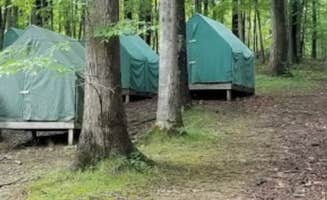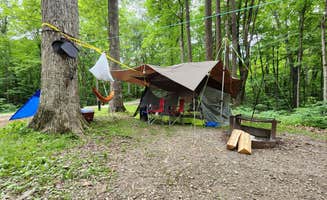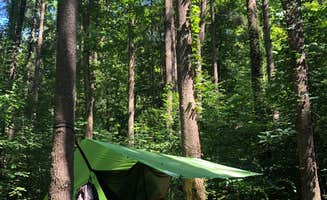Dispersed camping options near Jasonville, Indiana offer primitive tent sites in dense forest settings with few amenities. The Hoosier National Forest provides several wilderness areas within a 60-75 minute drive southeast of Jasonville, while closer options exist in Owen-Putnam State Forest about 35 minutes southwest. Most primitive sites require self-contained waste disposal, campfire management according to forest regulations, and preparation for limited cell service throughout these areas.
What to do
Geode hunting along creeks: At Charles C. Deam Wilderness, creek beds offer surprising geological discoveries. "I walked the creek for hours just looking at all the rocks on the sandbars. I have never encountered so many geodes in my life. Truly magnificent to encounter," reports Sarah R., who hammock camped along Patton Cave Trail.
Extended backpacking trails: Connect to multiple trail systems for longer adventures. "A wonderful backpacking area!" says Darren L. about the Sycamore Trail in Charles C. Deam Wilderness. The trail follows "a nice little stream along the one side" with established campsites featuring "rock fire rings and bushcraft furniture."
Lake access exploration: Several primitive camping areas provide access points to Monroe Lake. At Hickory Ridge Primitive Dispersed Campsites, campers can combine overnight stays with daytime exploration of the lake. "Hiking is fantastic!" notes Jimmy H., who found the area accessible even "in a sedan in the winter."
What campers like
Solitude and privacy: Morgan-Monroe State Forest offers quiet camping experiences away from crowds. "My favorite forest with traditional camping, backwoods camping, and a wonderful secret pioneer cabin for rent," shares Sars C., who recommends trying "the backwoods camping area for the Low Gap Trail" for solitary sites.
Natural surroundings: Primitive tent camping areas provide immersion in undisturbed forest settings. "This place is the gift that keeps on giving being so close to the city. Beautiful sites on the lake, and dozens of other spots scattered throughout the forest as well," writes Steven D. about the Charles C. Deam Wilderness.
Skill development opportunities: The minimal amenities encourage self-sufficiency and outdoor skills practice. "Good spot to get some quiet time to learn/hone skills or for some good quality time with the family while being plugged into nature and unplugged from their electronics," notes Jase G. about Hickory Ridge.
What you should know
Self-registration systems: Most forest camping areas use self-registration. "When you arrive set up at your site. Then you will need to go WITH EXACT CHANGE to the sign in at the main building," explains Rob R. about Morgan-Monroe State Forest. "Make sure you take your tag to mark your site, it is in the box attached to the payment envelope."
Seasonal considerations: Wet periods create challenging conditions. "The only negative was that we came after a lot of rain. So everything is permanently wet and mosquitos/ticks abounded," reports Sarah R. from Charles C. Deam Wilderness. Spring and fall typically offer better conditions with fewer insects.
Limited parking: Many primitive areas have restricted parking. At Hickory Ridge, access roads can be challenging but passable with careful driving. "I pulled in at midnight in a sedan in the winter and I was able to safely find my way," notes Jimmy H., though daytime arrival is recommended for first-time visitors.
Tips for camping with families
Scout camps for organized experiences: Ransburg Scout Reservation offers more structured camping with amenities suitable for families. "Located on Monroe Lake, they have canoeing, row boats, sailboats, motor boats, and skiing," writes Margo B., who notes they have both "cabin and tent camping" options with a "top notch" mess hall.
Consider site terrain: Many primitive sites have uneven ground. "I was slightly disappointed by the site selections being mostly on a slant, but we did find one on the overfill site that suited our needs and we ended up loving it," shares Rickie F. about Morgan-Monroe State Forest.
Water access planning: Water sources are limited at primitive sites. "Refill your water when you come across it; the lake is harder to get to than you think," advises Jessica T. from Charles C. Deam Wilderness, recommending water filtration equipment for backcountry camping.
Tips from RVers
Size restrictions: Most primitive camping areas limit RV size. At Owen-Putnam State Forest Rattlesnake campground, sites accommodate only small campers or tent setups. "Primitive only no drinking water at campgrounds," notes Nicole B., emphasizing the basic nature of these sites.
Morgan-Monroe considerations: The forest offers limited RV-friendly sites. "We are RV campers and there are only about 5 sites we could get in to. Our camper is about 25' and it was tight getting in and out of the campground," explains Ron H., adding that smaller campers under 15 feet would have more options. "There is a dump station, but I barely got in to dump. So not real RV friendly."




